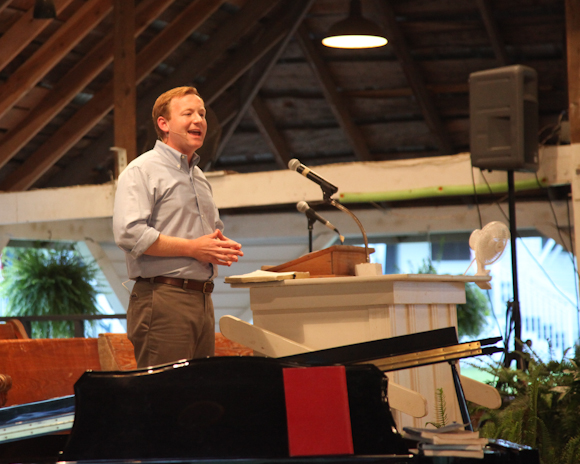Seedbed.com recently started a new Preaching Collective. I’ll be a regular contributor there and wanted to share my first post with you!

“If you can learn to do this one thing, I guarantee you’ll get more responses from your sermons.”
When one of my mentors said this to me over coffee about a year ago, I listened intently. It sounded like he was about to tell me a closely guarded secret that people, including my seminary professors, had been keeping from me.
“Learn to preach without notes. It won’t necessarily lead to you preaching better content, but it will lead to a deeper connection.”
I thought about his words, admitted my fears, and committed to making it happen. After a year of preaching without notes, I’ve discovered he was right.
My sermons now connect with my congregation in a way they never did when I had my rehearsed manuscript. I receive more positive feedback than ever before. People often tell me what they’ve been thinking about the sermon weeks after I’ve preached it. And stories about people being “doers of the Word” are becoming more and more frequent.
My mentor didn’t give me a handy ten steps to learn how to preach without notes, but over the last year I’ve learned from many others who’ve made the journey before me. Here are the five most helpful things I’ve put into practice:
1. Let connection take priority over precision
Most preachers are trained in seminary settings that prize precise language, perfect grammar, and phrases that read beautifully. But if you’re going to preach without notes, you have to be willing to sacrifice some precision of language for the sake of connection—unless you can memorize long form content verbatim on a weekly basis.
This doesn’t mean that you don’t do careful exegesis or commit certain phrases and transitions to memory. It does mean that you let eye contact and being fully present with the congregation take precedence over those sentences that took you hours to painstakingly craft in your study.
As Will Willimon recently wrote, “Even when we know our manuscript well, we tend to look at the manuscript rather than look at our listeners. We miss clues that our listeners are sending us when they don’t understand, or when they are losing interest.
2. Understand your sermon
Don’t try to memorize your sermon. It will be extremely difficult and probably leave you frustrated. Instead, simply understand your sermon. It’ll make preaching it without notes much easier.
Carey Nieuwhof puts it this way: “When you understand the structure of your talk, you understand your talk.” And when you understand your talk, you can stand in front of people without worrying that you’ll forget everything.
To help understand and remember the structure of my sermons, I often use structures popularized by others such as Andy Stanley’s Me, We, God, You, We or Paul Scott Wilson’s Four Pages of the Sermon. Other times, I create a structure unique to the text I’m preaching.
In all cases, I make an outline of the talk’s structure with as much detail as I feel I need for every point. When I started, I converted manuscripts to detailed outlines, and then converted those to simple outlines. Now, I start with a detailed outline to save time.
Before I step in front of the congregation, I make sure I can write down the structure of my sermon on a sheet of paper with no hesitancy. Then, even if I forget specific points or phrases, I know I can still convey the big picture.
3. Practice out loud on location
Most performers wouldn’t step on stage without having rehearsed what they’re going to say and do. Most preachers will.
If you want your sermons to stand out, the most effective thing you can do after understanding your sermon in your head is to hear it in your ears. Yes, I know it’s awkward. But it’s less awkward to discover that your sermon is too dense, has too many stories, or is it just plain bad while you’re alone than when you’re surrounded by a crowd of people.
Schedule practice time into your sermon preparation and try to rehearse in the room where you’ll be preaching. This will help you get a feel for the room, platform, lighting, and other elements.
Like Tim Ferriss does when he’s rehearsing public speaking, I’ll write down one-liners and phrases that I like so that I can remember them for later. And I continue going through my message until I nail it once.
You can read the last two points here.